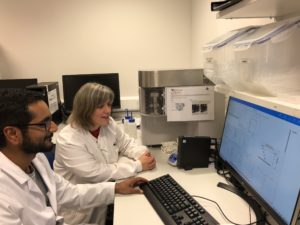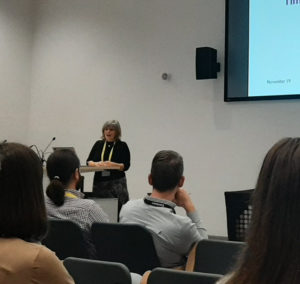MRC I’m A Scientist 2019 – Shonna Johnston
Connecting students with science
Applications are now open to find 25 MRC researchers and technical experts for the next I’m a Scientist Medical Research Zone in March 2020. Shonna Johnston, Flow Cytometry Facility Manager at the University of Edinburgh Queen’s Medical Research Institute, shares why more technicians should give it a go.
Earlier this year, I took part in the I’m a Scientist MRC Festival Zone – an online competition giving school students the chance to connect with researchers and technical experts. The students challenged competitors in fast-paced live chats, asking anything they wanted, then voted for their favourite person to win a prize of £500 towards a public engagement activity of our choice.
Entering the competition was a fantastic opportunity to show how accessible science is as a career choice and perhaps inspire the students to think about becoming a technical specialist, just like me.
Becoming a technical specialist
I was the first person in my family to go to university and from there I was fortunate enough to get a job as a university group research technician. I was then given the opportunity to train as a flow cytometry operator and as the technology expanded, so did my role.
Flow cytometry is one of many technologies which have developed into shared research, or ‘core’, labs in the last few decades. Flow cytometers can detect different cell types and help us understand their functions in the body.
Core labs tend to house large and expensive scientific instruments and are typically staffed by teams of technical specialists, who support and enhance the research across the institute. My team is involved in a wide range of projects from our centres, covering inflammation research, cardiovascular science, reproductive health and brain discovery research. I love the science and I’m now also involved in purchasing new equipment to improve the facility, commercial projects, business plans and marketing. There’s never a dull day!
Embracing the challenge
The I’m a Scientist MRC Festival Zone was something I was really excited about because it’s quite different to my usual day-to-day activities. I’m a bit reserved when it comes to social media platforms and online chatrooms. As the oldest scientist in the 2019 MRC Zone, I wanted to challenge myself and thought that the real-time online chats in the competition would be a good way to go outside my comfort zone.
The format of the chats encouraged some interesting conversations with the students as well as their teachers, the moderators and other researchers within the Zone. Sometimes it was hard to keep up with the pace. The students were really surprised to learn that, like academics, technicians attend conferences and present at meetings.
A few of the conversations were so engaging that they continued offline with my colleagues, stimulating some interesting scientific discussions. For example, the students were interested in how my role advanced medical research. Working in the flow cytometry lab, we are often focused on the service we’re providing and removed from the science we support – so afterwards I spent some time with our medical researchers furthering my knowledge about the clinical applications of our research.
Dispelling myths and inspiring futures
Students sometimes have ideas about what science, technology, engineering and mathematics (STEM) is and careers in the field that may not be completely accurate. One student I chatted with thought that the curriculum science subjects – biology, chemistry and physics – are completely separate with no crossover. Working daily with flow cytometry, I rely on all three acting together to produce amazing data. And I’m certainly not the only scientist who would say that. Myths such as these are important to dispel so that students understand how interesting and diverse a career in science can be.
Hopefully, I was able to encourage a few students to continue with their scientific studies and maybe even become future scientists! I’d encourage all researchers, and especially technicians, to take part. Sharing your experiences might even renew your own enthusiasm for your science.
The application deadline for applying to next year’s Medical Research Zone is 3 February 2020.
Shonna Johnston is a member of the University of Edinburgh Technician Steering Committee member and Manager of the QMRI Flow Cytometry and Cell Sorting Facility. She enjoys painting and gardening and has recently started playing hockey. She can be found on twitter @SMJohnston27
A version of this post will appear on the MRC Insight blog in January 2020.





Recent comments